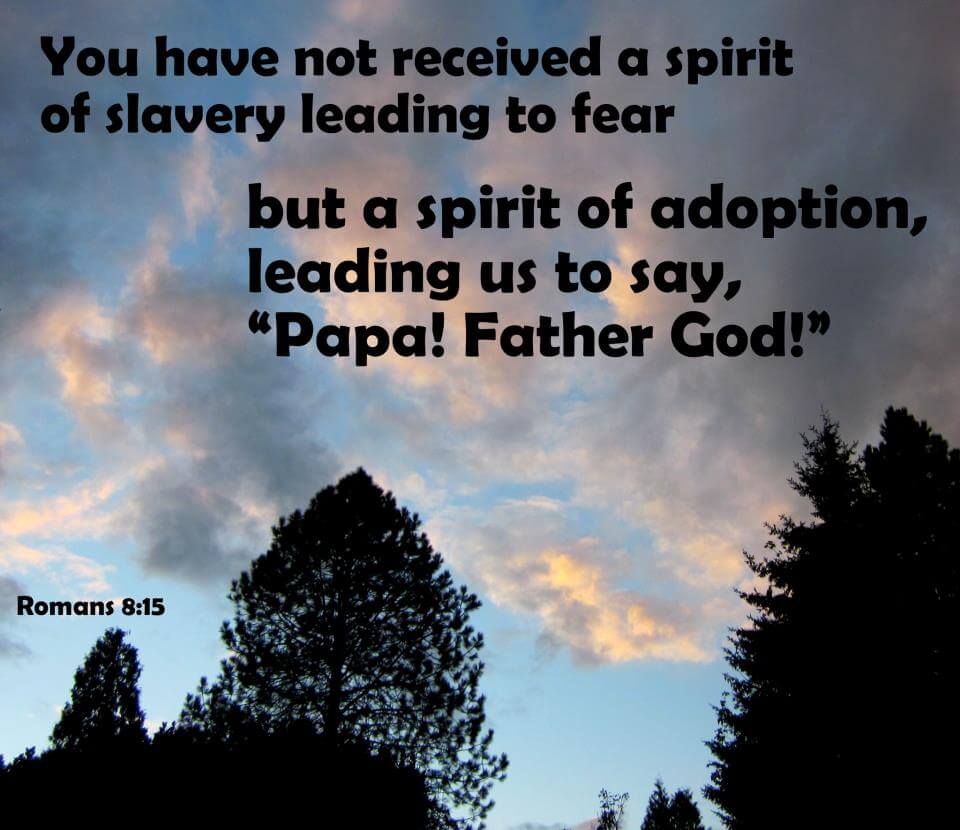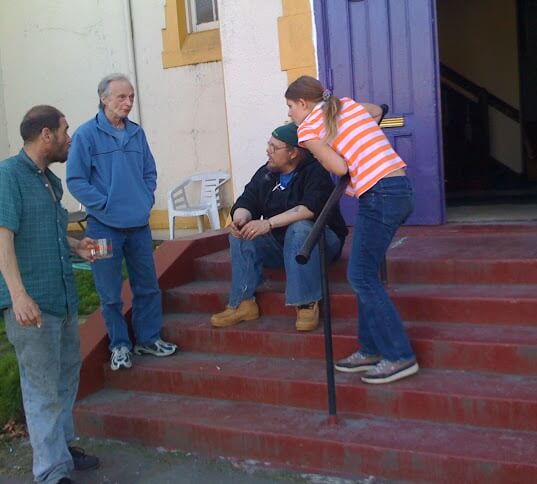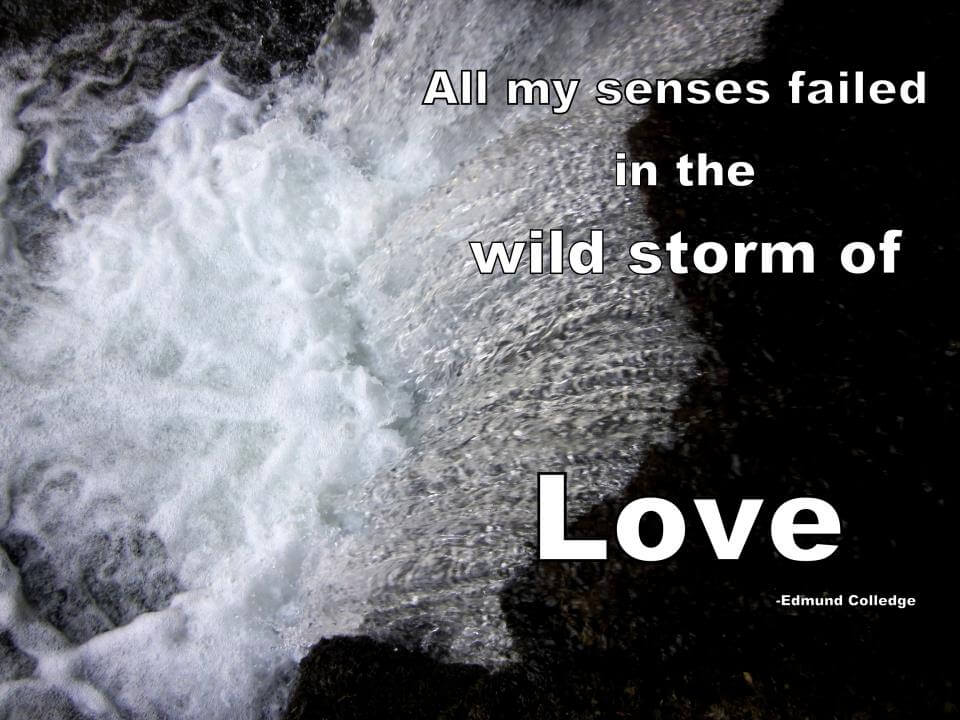-
How Would the World Look Different?
 Employers see the world in terms of karma:
Employers see the world in terms of karma:“Work well for me and you will be granted pay.
Work poorly and you will be fired.”
Religions see the world in terms of karma:
“We all deserve God’s punishment.
If others do us wrong, their punishment is rightly deserved.”
Parents see their parenting in terms of karma:
“Obey and you will be granted some limited freedoms.
Disobey and face wrath.
Harm my kid and you will die.”
Governments see the world in terms of karma.
“Break the law and you will be punished.
(unless the law is broken by the lawmakers).”
Jesus sees the world in terms of grace.
“Judge not lest you be judged.”
“The merciful will have mercy.”
“Forgive and you will be forgiven.”
“Welcome the prodigal.”
How would our religion, government, jobs and parenting look different if we are following Jesus?
-
Benefits of Street Ministry
Written on February 25
This afternoon I was at Walmart buying cat food. And then heading for the truck there is this Big Black Lincoln Navigator cruising through the parking lot at a good clip and making people scurry to get out of their path. Windows open, they laugh the laugh of arrogance and finally they come by me.
“SLOW DOWN,” I yell, and they come to a stop.The vehicle backs up. The young man sporting the tattoo of 666 in 3 inch blue letters across his forehead, says, “What did you say old man?”I leaned forward and said, “I said, slow down. If you want to be stupid do it somewhere where you aren’t going to hurt anyone.”
The young man climbs out of his rig and stands before me. How about I kick your ass old man? (Why is it that the biggest cars are driven by the smallest people?)I began to chuckle a little and that seemed to infuriate him more. “All I want you to do is to slow down and stop the game you were playing with the folks walking.” Might as well as been speaking to a post.
Now he has a knife (well, he called it a knife anyway) and then then other two who were in the backseat got out and approached from behind and they were acting all big and bad.
Now 30 years ago we would have done the dance but it was getting late and my body has been aching all day from the cold so I shot out a Psalm 61: Hear my cry O’ lord attend unto my plea… and then 6 guys from the Yellow Church showed up asking how I was doing? I said, “Well this guy with his knife and his buddies want to kick my ass….”They turned and my would be assailants were climbing back in the car and then left.
Ya know I am really terrible with remembering names and so if any of you are reading this forgive me but I can’t thank you enough for delivering me out of a sticky situation. It did my heart good to see you and to hear how you are continuing to follow the Lord. I really hope we can get together soon.
-
Basics

We need a friend as much as food
We long for joy as much as health
We thirst for respect as much as water
We seek peace as much as shelter
It is not enough to give a loaf to the poor
They also need encouragement
If a soup kitchen is accompanied with shame
It no longer seeks to be human
In our desire to love, let us not narrow our focus to survival
-
Exuberant Grace
Jesus offered Peter an opportunity to live in exuberant grace

“Come out on the water. Walk with me.”
Peter, in his enthusiasm, accepted. And he walked. And walked.
And then he realized his vulnerability.
At any other point, he would drown.
The waves rise high and threaten him.
And Peter feared. And sank.
There was no shame of sinking. We are only human.
And Peter cried out to the Lord for deliverance.
And Peter lived in grace.
But had he not feared, Peter would have walked in grace.

Jesus offers us opportunities to live in exuberant grace.
“Love your enemies.” “Surrender your possessions and give to the poor.”“Turn away from your addiction.”“Forgive those who have done you wrong.”
Then the doubts of our mind, of our friends, of our family overwhelm us.And we might, in our enthusiasm, accept. And we walk in Jesus’ grace. For a time.And we fear that God’s grace might not be sufficient.
We fear that we will live in our weakness and fail in everything.
We fear our vulnerability and that we might be harmed, or taken advantage of.
But Jesus is still calling: “Do not be afraid. Do not be afraid. Do not be afraid. Do not be afraid.”
The decision is ours:
Will we live exuberantly, mercifully, powerfully, surrounded by God’s grace?
Or will we live according to our fear?
-
Three Paths of Life
• Judgment is immediate.
It demands the quick decision and the sentence is as swift and demanding as a guillotine.
• Mercy is slow.
Mercy takes its time, deliberating, mulling over options. Mercy is often second-guessing itself, repenting of former decisions as repentance is made known.
• Cheap Grace is careless.
It cares not what the issues are, and is as swift in its decision of forgiveness as judgment is of condemnation.
• Judgment is simple.
Black and white, clear cut, no recourse, no compromise. Judgment sees all situations from a demanding, no fills position.
• Mercy seeks truth—no matter how messy.
It deliberates, considers, ponders, discusses—but not without a goal. Mercy plods, the tortoise who wins the race, slow and steady. Mercy understands that truth cannot be found in a headline, but in a feature article based on many interviews.
• Cheap Grace triumphs the ignorant.
There is no need for determinations, deliberations or decisions. The decision has already been made—freedom and blessing for all, no matter what the situation.
• Judgment focuses on the law as a principle.
“The law is a standard which once broken cannot be mended. It is the Humpty Dumpty of God. It is an ancient china doll, needing to be placed behind glass—protected, served, and loved from a distance.” But the law of judgment is cold, hard and sharp as a steel blade. Judgment claims to be for the good of society, but the only one who benefits is Judgment itself.
• Mercy loves the law as a benefit to others.
The law is to “love your neighbor,” thus mercy is the heart of the law. The law is to train us in mercy, to see the Other as the beneficiary of all of our actions. Mercy considers the well-being of all—even the law-breaker. Mercy’s law is comforting, light, for it always seeks the benefit of all.
• Cheap Grace discards the law.
“The law was a plaything of youth, but is to be set aside as unworthy of consideration. Grace has set aside all law, especially the law of Jesus, as unworthy of God.” Cheap Grace claims to speak for Mercy, but denies the heart of God.
• Judgment demands recompense.
Judgment seeks equity to the cost of the action of the law-breaker. “You broke it, you pay for it.” It seeks a balanced account book for which each debit has its equal and opposite credit—the coin of which is blood and dishonor.
• Mercy pursues reconciliation.
Mercy can lead to dishonor, should repentance be the flip side of that coin. Mercy pleads for restoration, constantly seeking an ingathering together for all the saints.
• Cheap Grace rejects cost.
Cheap Grace points to Calvary and claims that all had been accomplished there. Cheap Grace ignores the man who said, “All who would follow me must take up their own cross daily.” Cheap Grace demands no personal cost, no change, no death, no discipline, and so gains no gift, no new creation, no life, no restoration.
• Judgment has no escape.
Once judged, there is no exit. The sentence is irrevocable, the differences irreconcilable, the community ununitable.
• Mercy offers an out—repentance.
The one who has harmed another—and so has defied the law—has an opportunity to be brought back under the law. To repent, to reconcile is the extent that Mercy demands, and will seek any way to achieve that goal.
• Cheap Grace is unconditional forgiveness.
It is spiritual bloodletting—seeking to heal the patient, while ignorantly killing him. Cheap Grace sees no need to gather in, to restore, for there was no separation.
• Judgment demands payment from the lawbreaker.
As the law suffered, so must the criminal. As society was harmed, so must the harmer. Judgment claims the lost deserve nothing, and so gives nothing.
• Mercy sacrifices.
Restoration also has a price, and the merciful takes that price on oneself. Mercy pays whatever the cost so the sinner can be restored. Mercy groans in prayer, endures attacks, forgives debts against it, pays debts against others, sacrifices its comfort, its family, its friendships, its resources, its very life—all for the sake of the lost.
• Cheap Grace gleefully ignores cost.
It is the thief, stealing from God’s honor. Cheap Grace receives no payment, demands nothing, gives nothing, since there is no debt incurred. Cheap Grace celebrates at the foot of grace delivered, but ignores the call of grace transferred to others. Cheap Grace requires nothing and so gains nothing.
• Judgment never forgets.
It is the elephant of virtues. It never trusts, never believes, never forgives, never restores. Judgment says “Once a sinner, always a sinner.”
• Mercy gives the benefit of the doubt.
Mercy does not forget, but allows complete restoration, a rebuilding of trust. Mercy believes in new creation, a new life, which has nothing to do with the old.
• Cheap Grace always trusts, even the hypocrite.
It always believes, even the liar. It always forgives, even the unrepentant. It accepts everyone and everything—except God’s truth.
• Judgment is Satan.
Judgment is the accuser of the brethren, the murderer of humanity for the sake of a bloodless law. It is the prosecutor seeking the death penalty.
• Mercy is Jesus.
It is the self-sacrificer, the reconciler to God, the perfect sacrifice. Mercy is the one who said, “Go and sin no more,” “The one whom the Son sets free is free indeed,” “I have come to seek and save the lost,” “Unless you repent you will likewise perish,” “I have not come to call the righteous but the sinners to repentance,” “Be merciful as your Father is merciful.”
• Cheap Grace is the Flesh.
It is self-seeking, self-upholding, self-deceptive. Ultimately, it upholds what is abhorrent to God as the will of God. They practice sin and gives approval to those who practice it.
• Judgment is a liar.
It claims that God does not forgive, sees the sin and not the sinner. It denies the power of God to change the one in Jesus. It is lost, for it has forsaken the mercy of Jesus. Those in the power of Judgment will die by God’s hand—“Judge and you will be judged.”
• Cheap Grace is a liar.
It claims that God’s standard is flexible, and so non-existent. It loves the lost to such a degree that it cannot be separated from the lost. It causes the lost to remain lost, and so dead. Those in the power of Cheap Grace will die by God’s hand—“Whoever does not obey the Son will not see life.”
• Mercy is the truth of God.
It upholds the law, which is to love all. It demands love, even as it offers love. It demands forgiveness, even as it offers forgiveness. It demands sacrifice, even as it sacrifices. It demands purity, even as it offers purity. It demands devotion to God, even as it offers devotion to God. “Be imitators of God, and walk in love as Christ loved us and gave himself up for us.”
3733 N Williams Ave
Portland, OR 97227
503.888.4453
AnawimCC@gmail.com
Ministry Locations and Times »














